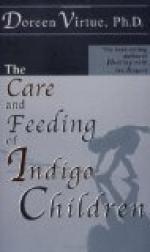What are the effects produced in infants by fresh air?
The appetite is improved, the digestion is better, the cheeks become red, and all signs of health are seen.
Is there any advantage in having a child take its airing during the first five or six months in the nurse’s arms?
None whatever. A child can be made much more comfortable in a baby carriage, and can be equally well protected against exposure by blankets and the carriage umbrella.
What are the objections to an infant’s sleeping out of doors?
There are no real objections. It is not true that infants take cold more easily when asleep than awake, while it is almost invariably the case that those who sleep out of doors are stronger children and less prone to take cold than others.
What can be done for children who take cold upon the slightest provocation?
They should be kept in cool rooms, especially when asleep They should not wear such heavy clothing that they are in a perspiration much of the time. Every morning the body, particularly the chest and back, should be sponged with cold water (50 deg. to 60 deg. F.).
How should this cold sponge bath be given?
The child should stand in a tub containing a little warm water, and a large bath sponge filled with cold water should be squeezed two or three times over the body. This should be followed by a vigorous rubbing with a towel until the skin is quite red. This may be used at three years, and often at two years. For infants a little higher temperature (65 deg. to 70 deg.) may be used.
WEIGHT, GROWTH, AND DEVELOPMENT
Of what importance is the weight of the child?
Nothing else tells so accurately how well it is thriving.
During the first year a record of the weight is almost indispensable; throughout childhood it is of much interest and is the best guide to the physical condition. It will well repay any mother or nurse to keep such a record.
How frequently should a child be weighed?
Every week during the first six months, and at least once in two weeks during the last six months of the first year. During the second year a child should be weighed at least once a month.
How rapidly should an infant gain in weight during the first year?
There is usually a loss during the first week of from four to eight ounces; after this a healthy child should gain from four to eight ounces a week up to about the sixth month. From six to twelve months the gain is less, usually from two to four ounces a week.
Is it to be expected that bottle-fed infants will gain as rapidly as those who are nursed?
They seldom do so during the first month; after that time under favourable circumstances the gain is usually quite as regular, and during the latter half of the first year it is likely to be more continuous than in a nursing infant, because the latter usually loses weight at the time of weaning.




